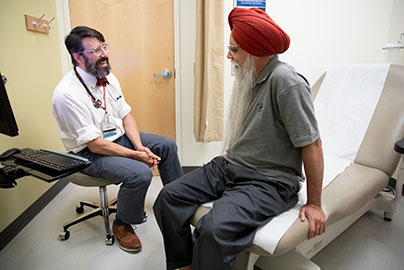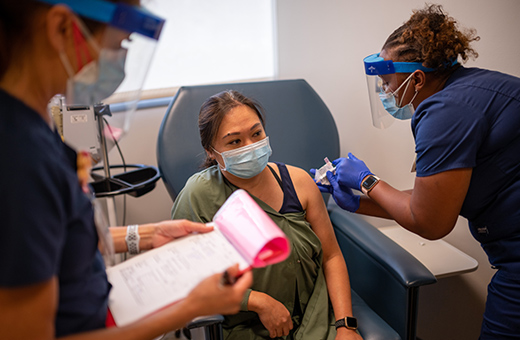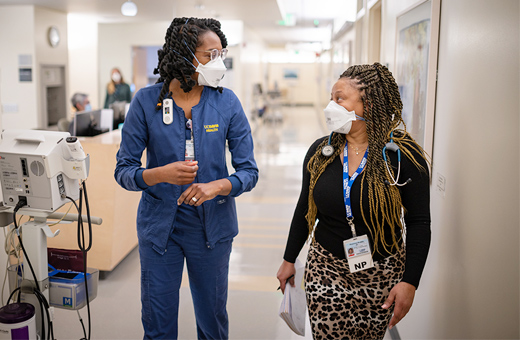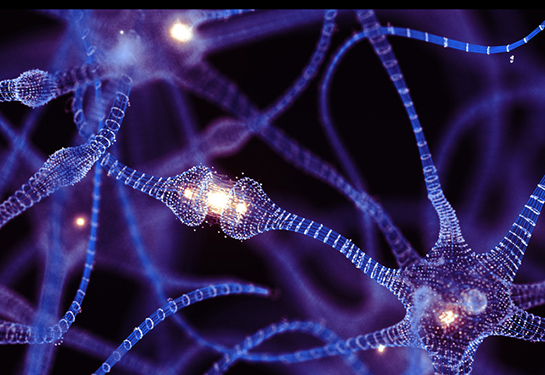Hormone Therapy
Our renowned cancer center has extensive experience in hormone therapy. You can rest assured that our experts provide you the best possible care.
Medically reviewed on Oct. 13, 2023.

Stopping Hormonal Cancer
Hormone therapy treats cancers that need hormones to grow, such as breast cancer and prostate cancer. We usually use it along with other cancer treatments like chemotherapy and radiation.
At UC Davis Health, we are regional leaders in using hormone therapy to treat cancer. Our highly skilled team members work together to take the best care of you.
How Does Hormone Therapy Work?
Hormone therapy drugs stop or slow the growth of cancer cells that use hormones to grow. It is also called hormonal therapy or endocrine therapy.
Hormone therapy drugs work by changing the amount of hormones in your body. They may work in a few different ways. For example, they may stop the body from making a hormone altogether. Or they may block a hormone from sticking to cancer cells. Finally, they may change how a hormone behaves in your body. Hormone therapy can be given in the following ways:
Oral
Many hormone therapy drugs can be taken by mouth in pill, capsule or liquid form. You can pick them up at your local pharmacy and take them at home on a regular schedule.
Injection
The drugs are delivered with a shot in your arm, leg, belly or hip. We inject under the skin or in a muscle. We give you the shot at our treatment center or we may teach you (or a caregiver) how to do it at home.
Surgery
Surgery is also a form of hormone therapy. It usually involves removing an organ that produces certain hormones. These could include the testicles (to reduce testosterone levels) or the ovaries (to stop estrogen production).
Request an Appointment
Our cancer specialists provide thorough evaluations and personalized treatment plans. Learn more about how to make an appointment at UC Davis Comprehensive Cancer Center.
Patients
New Patient Referral Office
916-734-5959
UC Davis Health Referring Physicians
For providers in UC Davis Medical Group or our Cancer Care Network
Physician Referral Center
916-734-5959
External Referring Physicians
For providers who are external clinicians
Referral Office
800-770-9261
Hormone therapy can be used on its own or with other treatments, such as chemotherapy, radiation and surgery. We can use it in different ways and at different times in your cancer journey, such as:
-

Before surgery and/or radiation
Hormone therapy can be used before surgery and/or radiation to shrink a tumor. This is known as neoadjuvant therapy.
-

During other cancer treatments
You may get hormone therapy at the same time as other cancer treatments if you have metastatic cancer. Metastatic cancer is cancer that has spread to other parts of your body.
-

After other cancer treatments
We can use hormone therapy after other cancer treatments to reduce the risk of the cancer returning. This treatment is called adjuvant therapy. We also can use it if the cancer comes back (recurrent cancer).
Hormone Therapy Side Effects
Hormone therapy interferes with your hormones, which means it can cause unwanted side effects. People respond differently to various treatments, so you may not have the same side effects as someone else. Here are the potential side effects for the two most common types of cancer that hormone therapy treats:
Breast Cancer
If you get hormone therapy for breast cancer, you may experience hot flashes, vaginal dryness, fatigue, nausea and decreased sexual desire. Other possible side effects include muscle or joint pain, osteoporosis and a higher risk of other cancers, blood clots, stroke, heart disease and cataracts.
Prostate Cancer
The side effects of hormone therapy for prostate cancer may include erectile dysfunction, decreased sexual desire and hot flashes. Other side effects may include bone loss, weight gain, decreased muscle mass, fatigue and an elevated risk of other health issues.

Ranked among the nation’s best hospitals
A U.S. News & World Report best hospital in cardiology, heart & vascular surgery, diabetes & endocrinology, ENT, geriatrics, neurology & neurosurgery, and pulmonology & lung surgery.

Ranked among the nation’s best children’s hospitals
U.S. News & World Report ranked UC Davis Children’s Hospital among the best in pediatric nephrology, orthopedics*, and pulmonology & lung surgery. (*Together with Shriners Children’s Northern California)

Ranked Sacramento’s #1 hospital
Ranked Sacramento’s #1 hospital by U.S. News, and high-performing in aortic valve surgery, back surgery (spinal fusion), COPD, colon cancer surgery, diabetes, gynecological cancer surgery, heart arrhythmia, heart failure, kidney failure, leukemia, lymphoma & myeloma, lung cancer surgery, pacemaker implantation, pneumonia, prostate cancer surgery, stroke, TAVR, cancer, orthopedics, gastroenterology & GI surgery, and urology.

The nation’s highest nursing honor
UC Davis Medical Center has received Magnet® recognition, the nation’s highest honor for nursing excellence.

World-class cancer care
One of ~59 U.S. cancer centers designated “comprehensive” by the National Cancer Institute.

A leader in health care equality
For the 13th consecutive year, UC Davis Medical Center has been recognized as an LGBTQ+ Healthcare Equality Leader by the educational arm of America’s largest civil rights organization.

